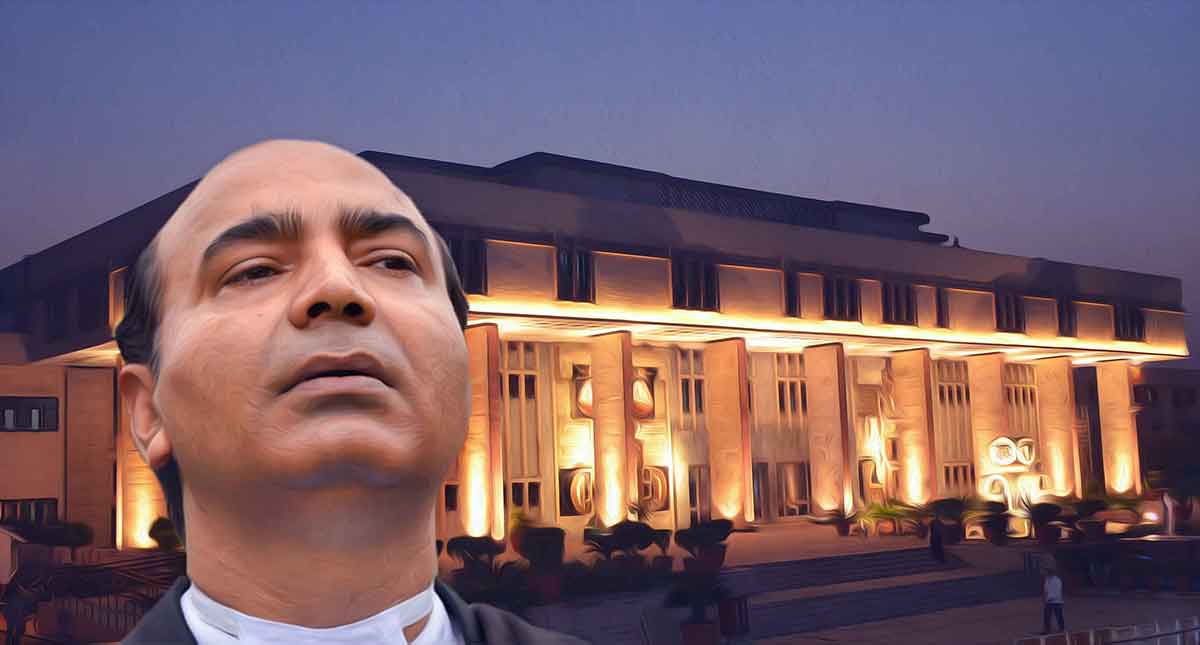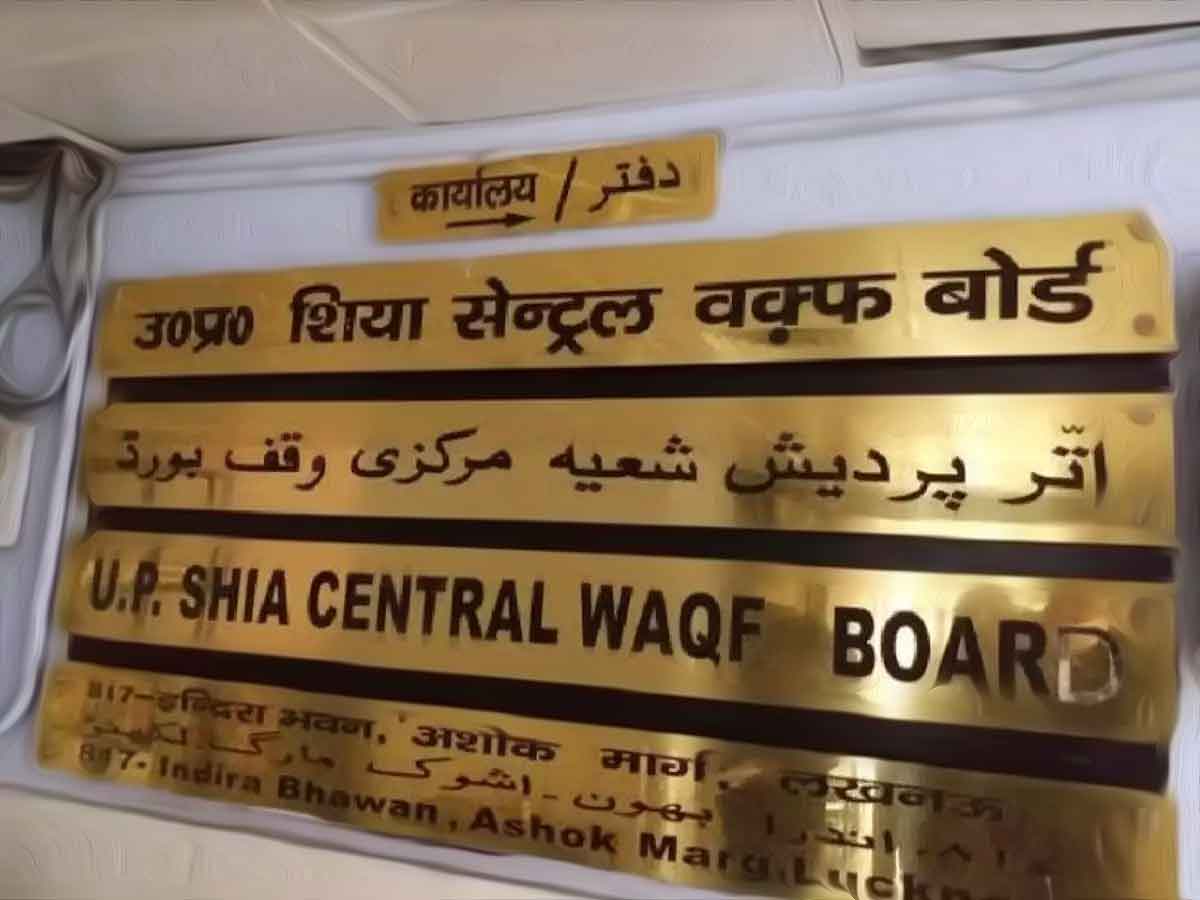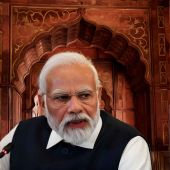Notice issued to Central govt on plea challenging the constitutional validity of Waqf Act 1995 by Delhi High Court: Ashwini Upadhyay filed the plea that Waqf Act is antithetical to Secularism in India

The Delhi High Court issued a notice on 20th April 2022 in a plea challenging the constitutional validity of the Waqf Act 1995. The plea was filed by Advocate Ashwini Upadhyay. Ashwini Upadhyay stated in his plea that the Waqf Act is antithetical to Secularism in India.
|
A Division Bench of Acting Chief Justice Vipin Sanghi and Justice Navin Chawla of the Delhi High Court issued notices to the Ministry of Home Affairs, Ministry of Law & Justice, Ministry of Minority Affairs, and the Law Commission of India in the matter, asking them to file their counter-affidavits within 4 weeks.
The court also issued a notice to the Central Waqf Board. The court had noted that the petitioner has not impleaded the Waqf board even though he had challenged the Waqf act. The bench directed to implead the Central Waqf Board and asked Upadhyay to make them a party to the case.
The next hearing in the case has been scheduled for 28 July.
 The Waqf Act, 1995 is against the right to equality guaranteed under Articles 14 and 15 of the Constitution of India |
Advocate Ashwini Kumar Upadhyay had filed public interest litigation (PIL) in the Delhi High Court challenging the Waqf Act 1995. The PIL stated that the Act is made under the garb of managing waqf properties but there are no similar laws for followers of other religions. The PIL challenged the validity of various provisions under this act. Upadhyay pleaded that the Act is against secularism, unity, and integrity of the nation. He also highlighted that the Waqf is not mentioned anywhere in the Constitution.
Additional Solicitor General Chetan Sharma represented the Union of India in the court. He told the court that this plea raises substantial questions, even though one of the aspects of the plea, i.e. that the act doesn’t mention a statement of the object and reason is incorrect.
|
|
Justice Naveen Chawla heard the petition and the response by the Union of India to the same. The petition challenged the validity of Sections 4, 5, 6, 7, 8, 9, 14 of the Waqf Act, 1995 and prayed for directions to the Central Government or Law Commission of India to draft a Uniform code for trust-trustees and charities-charitable institutions.
The petitioner, Advocate Ashwini Kumar Upadhyay, has challenged the validity of provisions of the Waqf Act, 1995 on the ground that they are "unfair" and "arbitrary", as there are "no similar laws for any other religious community in India".
 Waqf has not been envisaged anywhere in the Indian Constitution |
Other arguments made by the Petitioner are as follows:-
- A Waqf has not been envisaged anywhere in the Indian Constitution
- The Waqf Act, 1995, if made to protect religious minorities, must be in consonance with Articles 14 and 15 of the Constitution and must cover other religious minorities such Jains, Buddhists, Sikhs, Christians, etc and not be made solely for Islam.
- The provisions of the Waqf Act, 1995 grant special status to Waqf properties and give the Waqf board unbridled powers, while denying such powers to other religious institutions such as Trusts, Mutts, Akharas, etc.
- There is a lack of safeguards against the properties of Hindus, Jains, Buddhists, Sikhs, and other communities, from inclusion in the list of Waqf properties issued by the Waqf Board. This is because what property constitutes Waqf property is determined by the Waqf Board, subject to the order of the Waqf Tribunal.
- While Waqf Tribunals have been given special rights under Sections 54-55 of the Waqf Act, 1995, Trustees, Managers, Shebaits, Mahants, and other similarly situated persons managing and administering other religious institutions and properties do not enjoy similar rights and power. Thus, the Waqf Act, 1995 is against the right to equality guaranteed under Articles 14 and 15 of the Constitution of India
In his plea, Ashwini Kumar Upadhyay had said, “If the impugned Act has been made to protect the rights guaranteed under Articles 29-30 then it has to cover all the minorities i.e., followers of Jainism, Buddhism, Sikhism, Judaism, Bahaism, Zoroastrianism, Christianity, and not only Islam.” The petitioner argued that there is no safeguard for Hindus, Jains, Buddhists, Sikhs, and other Communities to save their properties from inclusion in the list of Waqf issued by Waqf Boards. Therefore, Hindus, Jains, Buddhists, Sikhs, Bahais, Christians, and Zoroastrians are discriminated against.
Ashwini Kumar Upadhyay pointed out how govt makes payments to Waqf Board but does not collect any revenue, and collects money from Hindu temples but does not spend anything on them. The plea said that the Waqf Board has Muslim MLA, MP, IAS Officer, town planner, advocates, and scholars as its members who are paid from the public exchequer, despite the fact the Centre doesn’t collect any money from mosques or dargahs. “On the other hand, States collect around one lakh crores from four lakh temples but there are no similar provisions for Hindus. Thus, the Act offends Article 27,” Upadhyay argued in his petition.
 The Waqf Act, 1995, if made to protect religious minorities, must be in consonance with Articles 14 and 15 of the Constitution and must cover other religious minorities such as Jains, Buddhists, Sikhs, etc |
The petition also seeks direction from the Central govt or the Law Commission of India to draft a ‘Uniform Code for Trust-Trustees and Charities-Charitable Institutions’ in the spirit of Articles 14 and 15 and publish it for public debate and feedback.
The disputes relating to the Waqf properties are decided by the Waqf Tribunal as per the Waqf Act. The PIL also challenges this provision and seeks direction that the dispute relating to religious properties shall be decided by the Civil Court only under Section 9 of the Civil Procedure Code 1908.
Earlier, the Supreme Court had refused to hear the plea seeking directions to the central government or the law commission of India to draft a ‘Uniform Code for Trust-Trustees and Charities-Charitable Institutions’ in the spirit of Articles 14 &15 of the Constitution. The Supreme Court’s bench said that it cannot direct the parliament to enact such a law.
References:
 Support Us
Support Us
Satyagraha was born from the heart of our land, with an undying aim to unveil the true essence of Bharat. It seeks to illuminate the hidden tales of our valiant freedom fighters and the rich chronicles that haven't yet sung their complete melody in the mainstream.
While platforms like NDTV and 'The Wire' effortlessly garner funds under the banner of safeguarding democracy, we at Satyagraha walk a different path. Our strength and resonance come from you. In this journey to weave a stronger Bharat, every little contribution amplifies our voice. Let's come together, contribute as you can, and champion the true spirit of our nation.
 |  |  |
| ICICI Bank of Satyaagrah | Razorpay Bank of Satyaagrah | PayPal Bank of Satyaagrah - For International Payments |
If all above doesn't work, then try the LINK below:
Please share the article on other platforms
DISCLAIMER: The author is solely responsible for the views expressed in this article. The author carries the responsibility for citing and/or licensing of images utilized within the text. The website also frequently uses non-commercial images for representational purposes only in line with the article. We are not responsible for the authenticity of such images. If some images have a copyright issue, we request the person/entity to contact us at This email address is being protected from spambots. You need JavaScript enabled to view it. and we will take the necessary actions to resolve the issue.
Related Articles
- Supreme Court halts Jahangirpuri demolition of illegal encroachments of rioters by NDMC on priority by keeping aside 70,632 pending cases: PIL filed by Jamiat Ulama-I-Hind, Advocate Dushyant Dave, and Kapil Sibal
- Left-liberals and wokes in India and across globe suffered a major meltdown the moment Elon Musk acquired Twitter Inc. in a $44 billion dollar bid: Twitter locked source code to save from disgruntled employees
- ‘Casteless Hindu’ is Not a Paradox. It is The keystone of ‘Ghar Wapsi’ and Hindutva
- Delhi Police Commissioner rubbished social media claims that saffron flags were hoisted atop a Jahangirpuri mosque, attempts of whitewashing the perpetrators by 'liberal cabal' and Altnews co-founder falls flat
- Global left-wing alliance is a reality and not a hidden conspiracy anymore as the organiser of the London conclave where Rahul Gandhi spoke wants India fragmented and become how the West would want it to be
- We present a list of trickery, hypocrisy, and biases of the Islamist propagandist Rana Ayyub as she manages to embarrass herself again by infuriating netizens of Saudi Arabia
- Calcutta Quran Petition: A petition to ban the Quran altogether was filed 36 years ago, even before Waseem Rizvi petitioned for removing 26 verses from Quran
- Uphaar Cinema fire was one of the worst fire tragedies in recent Indian history: Association of Victims of Uphaar Fire Tragedy (AVUT) filed a landmark case considered a breakthrough in civil compensation law in India
- Vidya Krishnan, columnist for ultra-leftist Caravan Magazine, The Atlantic, goes hysterical and calls Indian diaspora ‘termites’ over ‘Hindu homeland’ rant
- In another shocker, Supreme Court quotes 'every sinner has a future' and commutes death sentence of Mohd Firoz for rape & murder of 4-year-old girl: Child brutally assaulted, two teeth broken while smothering after rape
- Advocate Rastogi noted that required evidence could be procured only through an ASI survey, ‘Land belongs to Lord Vishveshwar, Aurangzeb had no right over it’: Argument in Allahabad HC in Kashi Vishwanath-Gyanvapi dispute
- ‘Liberal’ elites has issue with Hindu identity of PM Modi and emphasize "Aakhir Albert Pinto Ko Darr Kyun Lagta Hai" – Deciphering the latest rants of Naseeruddin Shah
- Secular Liberals identify two Muslim areas of a kind: One Muslim dominated area where Hindus ain't allowed, one inside intellectual space where Islamic extremism is whitewashed and any criticism is Islamophobic
- "Best advice I ever received was to give advice only when asked for it": State does not owe loyalty to any one religion and the Constitution requires that religious majority in the country shouldn’t enjoy any preferential treatment, Justice BV Nagarathna
- MEA spokesperson Arindam Bagchi condemns Somalia-born radical Islamist politician and US Congresswoman Ilhan Omar's visit to PoK, says her ‘narrow-minded politics’ violated India’s territorial integrity, sovereignty













